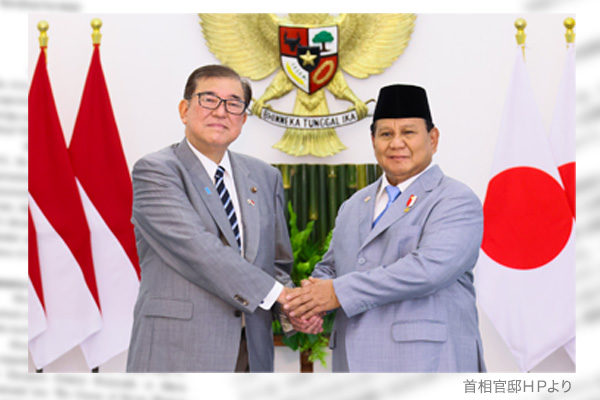I am gravely concerned over a foreign policy that Prime Minister Shigeru Ishiba mentioned in Indonesia on January 11. “Both Japan and Indonesia are island countries. They are very similar in pursuing a foreign policy while considering a balance between the United States and China,” said Ishiba in his meeting with Indonesian President Prabowo Subianto Djojohadikoesoemo.
Indonesia, which has the largest population and economy among the members of the Association of Southeast Asian Nations, has adopted non-aligned neutrality as its basic foreign policy. In reality, however, it has become closer to China and increased its distrust of the U.S. that supports Israel in the war in Gaza.
Ishiba, who told Indonesia that Japan and Indonesia commonly pursue a balanced foreign policy between the two major powers of the U.S. and China, is akin to Yukio Hatoyama who formerly led the Democratic Party of Japan and served as prime minister. Hatoyama advocated an East Asian Community initiative, which gave rise to a “Japan-U.S.-China equilateral triangle” theory for Japan to keep an equal distance with the U.S. and China. Hatoyama lacked the recognition that the U.S. is Japan’s ally. However, Ishiba’s way of thinking is even more dangerous than Hatoyama’s.
China taking advantage of a weak Japanese government
Today’s China is a far more serious threat than during the Hatoyama government. China no longer hides its intention to surpass the U.S. and rewrite the postwar international order. Under President Xi Jin Ping, China has enhanced the communist dictatorship. Not only the Chinese people but also the world face greater pressure in all of military, economic, and ideological fields. Japan-China relations are close to the lowest point. China bears most of the blame for the recent series of problems with Japan, including China’s unjustifiable accusation of treated water at the Fukushima Daiichi nuclear power station, its ban on almost all Japanese agricultural and fishery imports, stabbing incidents of Japanese school children in China, and China’s detention of Japanese nationals on espionage charges.
Against this backdrop, China is now playing a smiling diplomacy with Ishiba, who is stepping closer to China. The Chinese may have learned from their successful diplomacy following the 1989 Tiananmen Square massacre. At that time, in the face of global sanctions for the massacre, China targeted Japan, the weakest link in the chain of sanctions, shattering the chain and breaking out of its isolation.
Xi, who is once again harshly at odds with the Western world, sees Ishiba vulnerable and easy to win over because the Japanese prime minister has a weak political base, lacks diplomatic experiences, has poor political competence due to his years-long position as part of the opposition within the ruling Liberal Democratic Party, and is susceptible to great pressure.
Don’t undermine Abe’s legacy
In the first place, Ishiba has made a fundamental mistake regarding foreign policy priorities. Japan and China have already held the first meeting of their foreign ministers under the Ishiba government ahead of Chinese Foreign Minister Wan Yi’s expected visit to Japan in February, which could be followed by President Xi’s visit to Japan. Unless Japan realizes foreign minister-level and top-level talks with the U.S. before Xi’s visit to Japan, the U.S. may suspect that Japan gives foreign policy priority to China rather than the U.S. Foreign Minister Takeshi Iwaya’s hasty visit to Washington to attend U.S. President Donald Trump’s inauguration and seek a meeting with new Secretary of State Marco Rubio may be an alibi to dispel such suspicion in the U.S. Apparently for the same reason, Ishiba is accelerating efforts to arrange his visit to the U.S. for talks with Trump in February.
Ishiba seems to have replaced the U.S. with China as Japan’s foreign policy axis, reversing and undermining Japan’s grand strategy established by the late former Prime Minister Shinzo Abe. The LDP is responsible for rejecting such Ishiba politics that does not serve Japan’s national interests.
Yoshiko Sakurai is President, Japan Institute for National Fundamentals.


